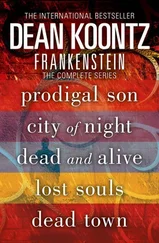The boy's difference was defined as much by what he didn't do as by what he did. For one thing, he didn't observe the Terrible Twos, the period of toddler rebellion that usually frayed the nerves of the most patient parents. No tantrums for the Pie Lady's son, no bossiness, no crankiness.
Uncommonly healthy, he didn't suffer croup, flu, sinusitis, or most of the ailments to which other children were vulnerable.
Frequently, people told Agnes that she should find an agent for Barty, as he was wonderfully photogenic; modeling and acting careers, they assured her, were his for the asking. Though her son was indeed a fine-looking lad, Agnes knew he wasn't as exceptionally handsome as many perceived him to be. Rather than his looks, what made Barty so appealing, what made him seem extraordinarily good-looking, were other qualities: an unusual gracefulness for a child, such a physical easiness in every movement and posture that it seemed as though some curious personal relationship with time had allowed him twenty years to become a three-year-old; an unfailingly affable temperament and quick smile that possessed his entire face, including his mesmerizing green blue eyes. Perhaps most affecting of all, his remarkable good health was expressed in the lustrous sheen of his thick hair, in the golden-pink glow of his summer-touched skin, in every physical aspect of him, until there were times when he seemed radiant.
In July 1967, at two and a half, he finally contracted his first cold, an off-season virus with a mean bite. His throat was sore, but he didn't fuss or even complain. He swallowed his medicine without resistance, and though he rested occasionally, he played with toys and paged through picture books with as much pleasure as ever.
On the second morning of Barty's illness, Agnes came downstairs and found him at the kitchen table, in his pajamas, happily applying unconventional hues to a scene in a coloring book.
When she complimented him on being such a good little soldier, abiding his cold with no complaint, he shrugged. Without looking up from the coloring book, he said, “It's just here."
“What do you mean?"
“My cold."
“Your cold is just here?"
“It's not everywhere."
Agnes delighted in their conversations. Barty was far ahead of the language learning curve for his age, but he was still a child, and his observations were filled with innocence and charm. “You mean your cold is like in your nose but not in your feet?"
“No, Mommy. Colds don't go in anybody's feets."
“Feet.
“Yeah,” he confirmed, applying a blue crayon to a grinning bunny that was dancing with a squirrel.
“You mean it's like with you in the kitchen, but not if you go into the living room? Your cold has a mind of its own?"
“That's really silly."
“You're the one who said your cold's just here. Maybe it stays in the kitchen, hoping it'll get a piece of pie."
“My cold's just here,” he expanded, “not every place I am."
“So ... you're not just here in the kitchen with your cold?"
“Nope."
“Where else are you, Master Lampion? In the backyard playing?"
“Somewhere, yeah."
“In the living room reading?"
“Somewhere, yeah."
“All at the same time, huh?"
Tongue clamped between his teeth as he concentrated on keeping the blue crayon within the lines of the bunny, Barty nodded. “Yeah.
The telephone rang, putting an end to their chat, but Agnes would remember the substance of it later that year, on the day before Christmas, when Barty took a walk in the rain and changed forever his mother's understanding of the world and of her own existence. Unlike most other toddlers, Barty was entirely comfortable with change. From bottle to drinking glass, from crib to open bed, from favorite foods to untried flavors, he delighted in the new. Although Agnes usually remained near at hand, Barty was as pleased to be put temporarily in the care of Maria Gonzalez as in the care of Edom, and he smiled as brightly for his dour uncle Jacob as for anyone.
He never passed through a phase during which he grew resistant to hugging or kissing. He was a hand-holding, cuddling boy to whom displays of affection came easily.
The currents of irrational fear, which bring periodic turbulence to virtually every childhood, didn't disturb the smoothly flowing river of Barty's first three years. He showed no fear of the doctor or the dentist, or the barber. Never was he afraid to fall asleep, and having fallen asleep, he appeared to have only pleasant dreams.
Darkness, the one source of childhood fear that most adults never quite outgrow, held no terror for Barty. Although for a while his bedroom featured a Mickey Mouse night-light, the miniature lamp was there not to soothe the boy, but to quiet his mother's nerves, because she worried about him waking alone, in blackness.
Perhaps this particular worry was not ordinary maternal concern. If a sixth sense is at work in all of us, then perhaps subconsciously Apes was aware of the tragedy to come: the tumors, the surgery, the blindness.
Agnes's suspicion that Barty would be a child prodigy had grown from seed to full fruit on the morning of the boy's first birthday, when he'd sat in his highchair, counting green-grape-and-apple pies. Through the following two years, ample proof of high intelligence and wondrous talents ripened Agnes's suspicion into conviction.
Precisely what type of prodigy Barty might be was initially not easy to deduce. He revealed many talents rather than just one.
Given a child-size harmonica, he extemporized simplified versions of songs he heard on the radio. The Beatles' “All You Need Is Love.” The Box Tops' “The Letter.” Stevie Wonder's “I Was Made to Love Her.” After hearing a tune once, Barty could play a recognizable rendition.
Although the small tin-and-plastic harmonica was more toy than genuine instrument, the boy blew and siphoned surprisingly complex music from it. As far as Apes could tell, he never hit a sour tone.
One of his favorite gifts for Christmas 1967 was a twelve-hole chromatic harmonica with forty-eight reeds providing a full three-octave range. Even in his little hands, and with the limitations of his small mouth, this more sophisticated instrument enabled him to produce full-bodied versions of any song that appealed to him.
He had a talent, as well, for language.
From an early age, Barty sat contentedly as long as his mother would read to him, exhibiting none of the short attention span common to children. He expressed a preference for sitting side by side, and he asked her to slide one finger along each line of type, so that he could see precisely the right word as she spoke it. In this manner, he taught him self to read early in his third year.
Soon he dispensed with picture books and progressed to short novels for more accomplished readers, and then rapidly to books meant for young adults. Tom Swift adventures and Nancy Drew mysteries captivated him through the summer and early autumn.
Writing came with reading, and in a notebook, he began to make entries about points of interest in the stories that he enjoyed. His Diary of a Book Reader, as he titled it, fascinated Agnes, who read it with his permission; these notes to himself were enthusiastic, earnest, and charming-but literally month by month, Agnes noticed that they grew less naive, more complex, more contemplative.
Having been a volunteer instructor of English to twenty adult students over the years, having taught Maria Elena Gonzalez to speak impeccable English without a significant accent, Agnes was little needed as a teacher by her son. Even more than other children, he asked why with numbing regularity, why this and why that, but never the same question twice; and as often as not, he already knew the answer that he sought from her and was only confirming the accuracy of his deduction. He was such an effective autodidact, he schooled himself better than any college of professors that could have been assigned to him.
Читать дальше











